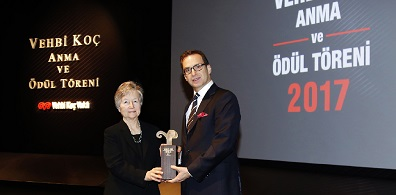Prof. Zeynep Ahunbay Wins the 16th Vehbi Koç Award

Prof. Zeynep Ahunbay Wins the 16th Vehbi Koç Award
This year’s The Vehbi Koç Award recipient was Prof. Zeynep Ahunbay for her pioneering work in cultural heritage. Prof. Ahunbay, one of the top conservation experts in the World, was presented her award by Koç in a ceremony held on February 23, 2017.
www.vehbikocodulu.com
Basis for Selection and about Prof. Dr. Zeynep Ahunbay:
The Selection Committee members Prof. Dr. Engin Akyürek, Prof. Dr. Sema Doğan, Prof. Dr. Aslı Özyar, and Prof. Dr. Turgut Saner, and chairman Prof. Dr. Mehmet Özdoğan summarised their basis for selection as follows:
Prof. Dr. Zeynep Ahunbay is a scholar who has developed a unique approach to protect a vast range of cultural heritage from archaeological sites through to Ottoman buildings, and has proven this approach in the restoration projects she has undertaken. She is one of the top experts in conservation in the world. A vanguard of architectural heritage conservation in Turkey, Ahunbay has trained numerous students and thereby contributed to the development of this field as a solid discipline.
Today cultural heritage is under increasing pressure; that is when the presence of scholars like Ahunbay dedicated to conservation becomes even more important. The pressure is great, the heritage deserving protection is greater, and genuine defenders of this struggle are few and far between. Ahunbay is universally respected for her stance, views and actions on scientific conservation of cultural heritage. She carries on this relentless fight to conserve architectural and archaeological treasures, and does so with her customary grace and equanimity.
Zeynep Ahunbay went to the American College for Girls in Arnavutköy before doing a Master’s Degree in Architecture and Civil Engineering. Having benefited from the era of cooperation between architectural historians and restoration experts at the Istanbul Technical University, Ahunbay’s professional career charted the same course, soon proven by her Ph.D. paper (1975) on the Sultan Ahmed Complex in Istanbul. She completed her Diploma Course on Conservation Studies at the University of York with a paper on the ancient city of Side; this work was later reflected in the restoration of the Temple of Apollo in Side.
Ahunbay has directed conservation and restoration projects in numerous locations such as Istanbul, Edirne, Bursa, Gaziantep, Safranbolu, Tarsus, Samsat, and Hasankeyf. Her high-profile accomplishments include Byzantine era restoration projects around Istanbul: Hagia Sophia, the Zeyrek (Pantokrator Convent) Church, and the Yedikule section of the Land Walls. She has, in the meanwhile, successfully converted her academic work on Ottoman era buildings and in particular the work of Mimar Sinan into restoration: by taking on the academic advisor role to countless institutions such as the Foundations Directorate, she has prevented major errors in restoration.
Ahunbay’s theoretical approach and architectural conservation attempts cover a vast range, from the urban through to individual building and minute detail, from Antiquity and the Byzantine Empire through to various stages of the Ottoman era. Her reputation has spread beyond the borders of Turkey, and invited not only her counsel but also actual restoration work on splendid Ottoman monuments in former Ottoman lands such as Aleppo, Jerusalem, Kosovo and the Yemen. That she was invited to the International Bosnia-Herzegovina Cultural Heritage Conservation Commission formed as an outcome of the Dayton Agreement that ended the Bosnian War is significant: throughout her eight years on the commission, she has played an active role in the decisions concerning the conservation and restoration of the country’s cultural assets as a whole, including the Bridge of Mostar.
Zeynep Ahunbay has served as President of the Turkish National Committee of the International Council on Monuments and Sites for two consecutive terms between 1999-2005, frequently participated in local Heritage Alert assessment boards on recommendations for the UNESCO World Heritage list, and offered advice. In addition, she has provided the staunchest possible academic support for the Turkish Chamber of Architects’ efforts to conserve architectural heritage. Together with the Turkish chapter of Europa Nostra, she has assisted the work of agencies and other NGOs on the protection of cultural assets. Architectural conservation is generally regarded as a construction issue in Turkey, one that needs little in the way of scientific publications; Ahunbay, in contrast, has published numerous articles and books. The basic textbook in architectural conservation in Turkey, the Tarihi Çevre Koruma ve Restorasyon [Conservation and Restoration of the Historic Environment] (1996) is one example; the Istanbul chapter on Dünya Mirasında Türkiye [Turkey in World Heritage] (2006) and her Cultural Heritage of Turkey (2009) are two others.
Ahunbay is world famous for her teaching and professional career. This is partly due to the opportunities offered by the newly enlightened Turkey in the Republican era; and the consensus of opinion amongst her colleagues attributes it to relentless hard work. Zeynep Ahunbay is a scholar with a reputation for uncompromising commitment to her principles in research and implementation. Although this direct and unequivocal professional stance essential to the introduction of universal principles in her own county has undoubtedly taken its toll, by positively instilling them in numerous students, she has multiplied those same principles.
Conferring the Vehbi Koç Award on Zeynep Ahunbay for her model career, ground-breaking contribution to the science of cultural heritage and steadfast attitude in professional ethics will surpass the personal aspect of the award, and stimulate much-needed rational and committed attitudes in all professional areas.
Please click to watch the film about the basis for selection (in Turkish).



